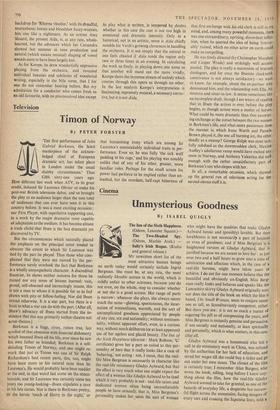Television
Timon of Norway
By PETER FORSTER 'THE first performance of John Gabriel Borkman, the latest masterpiece of the acknow- ledged chief of European dramatic art, has taken place in London under the usual shabby circumstances.' Thus GBS sixty-one years ago. How different last week when ATV, to its great credit, induced Sir Laurence Olivier to make his post-war British television debut, and.so brought the play to an audience larger than the sum total of audiences that can ever have seen it in this country before. It was a most exciting occasion : our First Player, with superlative supporting cast, in a work by the major dramatist most capable of adaptation to the medium. It has become almost a trade cliche that Ibsen is the best dramatist yet discovered by TV.
But the circumstances which naturally placed the emphasis on the principal actor tended to obscure the extent to which Sir Laurence was tied by the part he played. Thus those who com- plained that they were not moved by the per- formance surely overlook the fact that Borkman is a wh011y unsympathetic character. A discredited financier, he shows neither remorse for those he ruined nor any sense of lessons learned; vain, proud, self-obsessed and increasingly insane, this is not a man to whom it is possible for us to feel drawn with pity or fellow-feeling. Nor did Ibsen intend otherwise. It is a star part, but there is a limit to what a star can do with the part. (After all, Shaw's advocacy of Ibsen started from the in- sistence that this was primarily author-theatre not actor-theatre.) Borkman is a huge, riven, rotten tree, last symbol of that obsession with financial dishonesty which haunted Ibsen all his life, ever since he saw his own father so branded; Borkman is a self- deluding Timon of Norway, and one might re- mark that just as Timon was one of Sir Ralph Richardson's best recent parts, this, too, might have' been more to his natural taste than Sir Laurence's. He would probably have been madder at the end, in that weird last scene on the moun- tainside, and Sir Laurence was certainly some ten years too young-looking—Ibsen stipulates a man in his late sixties. Nor is there in Borkman poetry, or the heroic 'touch of Harry in the night,' or that humanising irony which are among Sir Laurence's Unmistakably individual traits in per- formance. Even so, he was fully 'the sick wolf padding in his cage,' and his playing was notably unlike that of any of his other, greater, more familiar roles. Perhaps for the small screen his power had perforce to be implied rather than un- leashed, but the mordant, half-rapt bitterness of that first exchange with his old clerk is still in my mind, and, among many powerful moments, there was one extraordinary, uprising, discordant inflec- tion, when he queried the idea of being 'irrevoc- ably' ruined, which no other actor on earth could make so compelling.
He was finely directed (by Christopher Morahan and Caspar Wrede)' and strikingly well accom- panied. The play is really a succession of bravura duologues, and for once the Ibsenite clockwork contrivance is not always satishctory—we want to know, for example, about the ex-partner who denounced him, and the relationship with Ella, his mistress and sister-in-law. It seems sometimes like an incomplete draft, though I am weary of reading that in Ibsen the action is over before the play begins, as though action were a matter of horses.. What could be more dramatic than that excoriat- ing exchange at the outset between the two women in Borkman's life, and What more passionate than the manner in which Irene Worth and Pamela Brown played it, the one all burning ice, the other deadly as a swamp? George Relph was most tact- fully subdued as the downtrodden clerk, Maxine Audley's adulterous vamp would have melted any snow in Norway, and Anthony Valentine did well enough with the rather unsatisfactory part of Borkman's son who elopes with her.
In all, a remarkable occasion, which showed up the general run of television acting for the second-eleven stuff it is.






























































 Previous page
Previous page